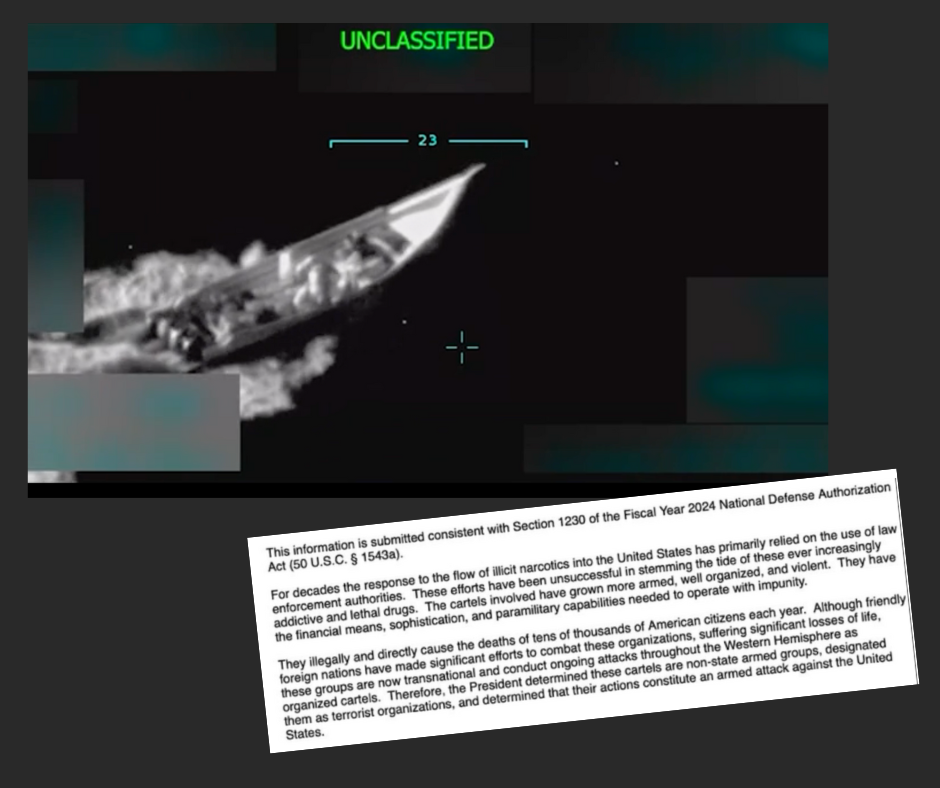The Brief: So Many Red Flags

Hi friends,
There have been a number of developments in the last couple of weeks related to the U.S. military strikes in the Caribbean Sea. I’d like to cover these updates in this week’s edition of The Brief, as well as to provide some context for why I think they’re significant.
The Trump administration claims the U.S. is in a non-international armed conflict against cartels
You may recall from our September explainer that when U.S. military strikes in the Caribbean Sea first began, the executive branch had not publicly stated that the U.S. was in an armed conflict against the organizations being targeted. That has now changed: two weeks ago, the Trump administration reportedly sent a notice to Congress stating that it considers the U.S. to be in a non-international armed conflict (NIAC) against drug cartels it has designated as foreign terrorist organizations, that these cartels constitute non-state armed groups, and referring to members of cartels as unlawful combatants.
For those new to the law of war, the term “non-international armed conflict” can be used to describe a civil war within a country, as well as hostilities that are conducted against non-state actors (e.g., Al Qaeda) instead of against state actors (e.g., Germany in World War II). The second meaning of NIAC—a conflict against non-state actors—is what’s being used here.
A Senate measure to stop the strikes has failed
As previewed in an earlier video we posted on the strikes, on October 8, Democratic Senators Adam Schiff and Tim Kaine brought a measure under the War Powers Act to halt the use of U.S. armed forces in strikes on cartels. Senator Schiff explained his position on the Senate floor, stating, “The president has used our military to strike unknown targets on at least four occasions, and he is promising more. With at least 21 people dead, and more killing on the way, with the president telling us that strikes on land-based targets may be next, we ask you to join us and reassert Congress’ vital control over the war power.”
However, the vote failed 51 to 48, with Senators Lisa Murkowski and Rand Paul the only Republicans to support the bill, and Democratic Senator John Fetterman voting against it.
Why it matters
1. The Trump administration is trying to significantly expand what would constitute an armed attack justifying the use of military force
In its notice to Congress, the Trump administration alleges that unspecified actions by cartels “constitute an armed attack against the United States” and that the U.S. “must use force in self-defense…against the ongoing attacks”. I’ve written about this before, but in general, self-defense requires an actual or imminent armed attack, and the use of force in response should be both necessary and proportional. Even taking the White House’s version of the facts at face value, their position would mean that simply transporting drugs that may eventually reach the United States is an attack that can be stopped with the use of lethal military force. Historically, what sort of acts justify self-defense under international law is a concept that has changed with the times: what might, in the not too distant past, have looked like a foreign ship in our territorial sea firing canons at our Navy might, under the “War on Terror,” look more like members of a terror cell sitting in a safe house planning a bombing at an airport. More recently, there has been debate over what sorts of cyberattacks might constitute armed attacks, though even in that case, the U.S. has previously said that self-defense against a cyberattack should include a determination that the cyberattack would proximately result in death, physical injury, or significant destruction.
But these facts go beyond even that paradigm. These are drugs on boats still far from U.S. shores that the U.S. has admitted, on at least one occasion, that it could have stopped and seized, but instead blew up to teach a lesson. The harm is not proximate. There are many, many steps between when drugs are unloaded from a boat in Latin America to when someone might die from a fentanyl overdose in the United States, and those steps matter, no matter how devastating those deaths are and how much we want to prevent them from happening.
So why does that matter? In short, because if transporting drugs is not actually an armed attack under international law, then the Trump administration was not properly acting in self-defense when it struck the boats, and the killing of the people on board was unlawful.
2. The Trump administration is asserting the authority to kill members of cartels without due process of law by classifying them as “combatants” rather than “criminals”
At the risk of sounding like a broken record, the interdiction of ships suspected of carrying drugs is something that has been done for decades, by the U.S. Coast Guard, under a law enforcement paradigm. The U.S. is breaking from those established processes to militarize a law enforcement operation, and then using that militarization as a justification to kill people without a trial. It does not take a huge leap of imagination to envision how this could translate into the use of lethal force within the United States. Even Republican Senator Todd Young, in a statement explaining why he did not support the War Powers Act measure discussed above, nevertheless expressed concern that “if one thinks of the ‘War on Drugs’ as a real war, it could conceivably lead to an increasingly militarized ‘War on Drugs’ inside the United States.”
It’s interesting to note, however, that the White House itself isn’t really using “War on Drugs” language in its justification of the strikes—instead, it’s using the language of the “War on Terror,” including by designating the cartels as terrorist organizations. The president is simultaneously asserting that he can use lethal force against terrorists, and saying that a terrorist is anyone the president says he is, as his recent executive order designating “Antifa” as a domestic terrorist organization indicates. This is troubling enough on its own, but it’s especially so because:
3. We don’t actually know who or what is on the boats that are being blown up
One of my (many) concerns about the armed conflict framing here is that neither the public nor Congress are being informed about who, exactly, the U.S. is purportedly in a conflict with, or what evidence supports the conclusion that the people who were killed were part of those organizations. The notice to Congress claiming that the U.S. is in a NIAC did not actually name any of the cartels the Trump administration believes are part of the conflict. The Associated Press has reported that Congress has not been provided with evidence that the boats targeted in the strikes had narcotics on board, and that instead the administration has pointed only to video clips of the strikes themselves (which, as you may recall, do not actually show any drugs). In the debate on the War Powers Act measure he introduced, Senator Tim Kaine stated, “President Trump…has refused to provide Congress with basic information about who was killed, why the strikes were necessary, and why a standard interdiction operation wasn’t conducted.”
To connect the dots here, the president is asserting that ordinary criminal activity is an act of war; that he can authorize lethal military force in response without the consent of Congress; and that he does not have to provide evidence to Congress or the public that the people killed were part of that war either by virtue of their activities or their membership in unidentified organizations.
It’s red flags all the way down, folks.
Two additional notes before we close out: first, there are several other aspects of the law of war that the notice to Congress and the Trump administration's recent actions would implicate, including questions of whether cartels could actually constitute a non-state armed group. I didn’t cover those aspects today, but I can recommend a great podcast episode with former colleagues of mine over on Just Security if you’d like a deep dive on these issues.
And second, while there are a lot of unknowns discussed above, we now know that Venezuela is no longer the only country affected by the strikes: Colombian president Gustavo Petro posted on October 8 that a recent U.S. strike was on a Colombian boat, and had Colombian citizens on board. President Petro denounced the strike, and has also called for an international investigation into the strikes, including to identify those killed.
What to watch out for
Whether additional strikes are carried out; whether Colombia follows up on its call for an international investigation into the strikes; whether the Senate Foreign Relations Committee holds a hearing on the situation; whether the Senate makes another run at a War Powers Act measure, which Senators Schiff and Kaine had previously said they might do if the first measure didn’t pass.
Also on my radar
- You can’t make this up: French president Emmanuel Macron has reappointed Sébastien Lecornu as prime minister less than a week after he resigned from that role (which in turn was after less than a month after his initial appointment). Political opponents have suggested they will bring a no-confidence motion against Lecornu in the National Assembly;
- A former colleague has written an excellent article explaining the recent Executive Order purporting to commit the United States to defend Qatar in the event of an armed attack;
- In Gaza, Hamas released 20 hostages to Israel, in exchange for nearly 2,000 Palestinian prisoners and detainees. President Trump told world leaders that it is time to start planning “phase 2” of the peace agreement, but as of this writing, further details have not been released as to what that looks like in practice.
Thanks for joining me this week, and I’ll see you back here soon.
Alexis
Looking for other ways to participate? Head over to the Community Engagement tab to learn about how to contribute a guest post, or how to bring me to your organization or classroom for an in-depth discussion of how to engage on foreign affairs and human rights in our current era. You can also follow The Connection on Bluesky, Facebook, Instagram, LinkedIn, and Threads.
